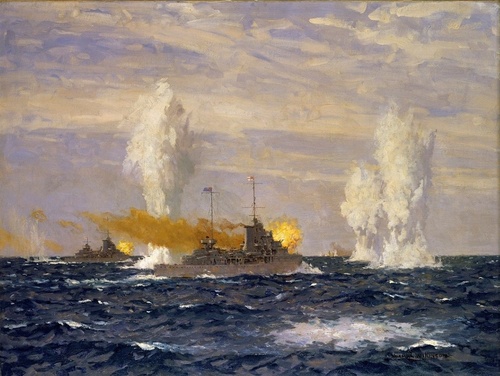Auction: 22003 - Orders, Decorations and Medals
Lot: 382
'There is a story in connection with the announcement of these honours to the ship's company of H.M.S. Ajax which is well worth repeating. The 11-inch shell which tore through the Ajax ended up in the Commodore's sleeping-cabin, having on the way smashed up the Captain's and the Commodore's bathrooms. The sailors, while fully appreciating the high honours that had been bestowed on their seniors, were still amused at the connection they could see with the damage in their ship. "Order of the Bath," one cheerful rating was overheard to say - "and they ain't got a blinking bath between them!" '
The King's Cruisers, by Gordon Holman, refers.
The Royal Navy L.S. & G.C. Medal awarded to Chief Petty Officer W. J. White, Royal Navy, who was present in the cruiser H.M.S. Ajax at the celebrated battle of the River Plate
Ajax - Commodore Harwood's command - was hit seven times by Graf Spee, the resultant damage including the disablement of her X and Y turrets with a loss of seven lives
Royal Navy L.S. & G.C., G.VI.R., 1st issue (JX. 131141 W. J. White, P.O., H.M.S. Pembroke), very fine
William James White was born at Lambeth, London on 21 March 1921 and entered the Royal Navy as a Boy 2nd Class in November 1927.
By the outbreak of hostilities in September 1939, he was serving as an Able Seaman in the cruiser H.M.S. Ajax, and it was in this capacity that he was quickly saw action in the battle of the River Plate.
The following extract has been taken from the 'H.M.S. Ajax and River Plate Veterans Association' website:
'In early December 1939, Commodore Harwood received enemy reports from the British freighters Doric Star and Tairoa as they were captured and sunk. He calculated that if the raider chose to head for South America, she would probably arrive in the area off the River Plate on the morning of the 13 December. With this in mind, Harwood ordered the cruisers, H.M.S. Ajax, Achilles and Exeter to concentrate there the previous day (12th December). They met at the pre-arranged time and exercised their action plan.
On the morning of 13 December H.M.S. Exeter was ordered to investigate smoke that was spotted on the horizon. She soon signalled, "I think it is a pocket battleship". The three ships had finally met Admiral Graf Spee and at 0617 they went into action, following Harwood's orders, "Attack at once, by day or night".
At first Graf Spee concentrated her fire on Exeter. Ajax and Achilles then closed on Graf Spee at speed, drawing her fire and causing significant upper deck damage and loss of morale. Graf Spee's Captain Langsdorff later said, "They came at me like destroyers". At 0636 Graf Spee about turned to the west, from where she started her retreat. With 66 of her crew killed, Exeter later retired from the battle badly damaged and made for the Falklands.
By 0725 Ajax and Achilles had closed to within four miles from Graf Spee. Harwood then decided to open the range and shadow her. However, Graf Spee steadied and concentrated her fire again on Ajax and Achilles. Ajax fired a salvo of torpedoes to encourage Graf Spee to maintain her westward course, which she did, but shortly afterwards Graf Spee obtained a hit on Ajax which put her two after-turrets out of action. Achilles also suffered severe damage to her director control tower from a near-miss. This was Graf Spee's chance to turn on the pursuers and regain the initiative but it was not taken. Captain Langsdorff chose to break off the action … '
Petty Officer Leslie Denis, aboard H.M.S. Ajax, has the final word:
'Graf Spee then drew off and set a course for Montevideo where the stage was set for her arrival. During the day, a radio operator from New York was giving a running commentary on events. We withdrew out to sea and heard everything on the ship's radio, broadcast throughout the ship, courtesy of the overseas service of the BBC which was picking up the transmission from the shore. So although we had withdrawn to the horizon, we had a ringside seat.
By this time, H.M.S. Cumberland had arrived from the Falkland Islands, and was a valuable addition to our force.
We withdrew out to sea and buried our dead. On 17 December the Graf Spee slipped her moorings and proceeded out to sea. We had closed to within five miles of the port. Graf Spee stopped just outside the three-mile limit and disembarked her crew. Shortly afterwards, huge explosions were heard from her - she was on fire. All ships closed in as far as was safe, and the order to cheer was given. The ships' companies cheered each other like mad … '
Job done.
White departed Ajax in April 1940, but not before participating in the major celebrations that took place in London and elsewhere, on Ajax's return to the U.K.
Subsequent career
His later wartime appointments comprised the cruisers Nigeria (September 1940-May 1941) and Euryalus (August 1941-January 1944), followed by the battleship Marlborough (January-April 1945).
He was finally discharged to a pension as a Chief Petty Officer in June 1953.
Subject to 20% VAT on Buyer’s Premium. For more information please view Terms and Conditions for Buyers.
Estimate
£240 to £280
Starting price
£220







